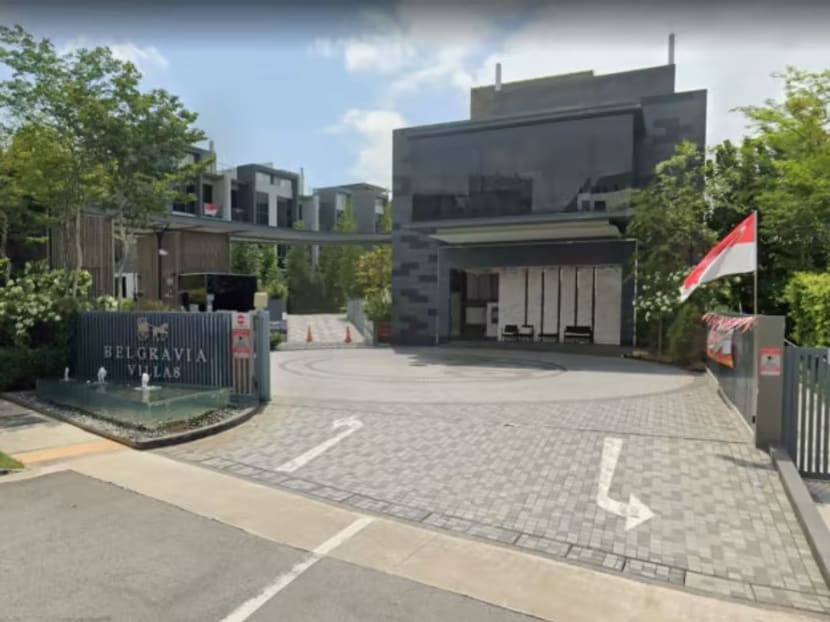Foreigner fined for getting Singaporean to buy S$3.4m cluster house on his behalf, says she scammed him

A screengrab from Google Maps showing Belgravia Villas.
www.todayonline.com
SINGAPORE — A Chinese national was fined S$50,000 by a court on Tuesday (June 13) for getting a Singaporean to buy restricted landed property on his behalf, a violation of residential property laws.
The court heard that the Singaporean woman, Song Fanrong, had scammed the man and two of his friends into taking part in the scheme.
The man, 41-year-old Chen Xiaopu, had agreed to buy the S$3.4 million property as he thought it would better his chances of getting permanent residency and eventually citizenship in Singapore.
He pleaded guilty to one count under the Residential Property Act of appointing Song as his nominee to buy a unit in Belgravia Villas — a cluster housing development.
Landed and cluster homes are classified as restricted residential properties, meaning foreigners generally cannot buy such properties. Those who wish to do so must submit applications to the Singapore Land Authority.
Read also
Woman confesses to acting as nominee for foreigners to buy landed properties in Singapore
The court heard that Chen got to know Song, a former preschool owner, through his friend Wang Cheng.Chen and Wang, along with a third Chinese national Liu Guohui, engaged Song's services to help them with an immigration application.
The three men wanted to move to Singapore and own homes here. Song told them that their chances of getting an immigration pass would be enhanced if they committed to buying a "substantial" property in Singapore.
Song told them they could not buy the properties in their own names as they were foreigners. She offered to buy the property on their behalf and said she would transfer ownership back to them once they obtained Singapore citizenship.
She recommended them the Belgravia Villas cluster housing estate, a freehold property in the Seletar and Yio Chu Kang area.
The three men agreed and Song hired a Singapore lawyer to prepare a draft trust deed, which was in fact not legal.
Read also
Legal first: Jail for buyers, agents who evaded S$69,000 in stamp duty by backdating option to purchase
Chen paid about S$1.8 million to Song, which was used for partial payment of the property.MEN DOUBT SONG
Chen and his two friends began to doubt Song after being warned by a mutual friend to be careful in their dealings with her.The three men engaged lawyers to look into the matter and discovered that Song had even mortgaged one of the three units as security for a transaction she was involved in with another China national.
Chen lodged a caveat in October 2014 to protect his interests and filed a police report about Song's fraud, stopping his payments to her.
Because the payments had stopped, the sale and purchase agreement was considered breached. At this time, Song had paid S$1.38 million to the developer for partial payment of Chen's property.
The developer forfeited about S$730,000 as the contractual penalty sum and refunded the remainder of about S$648,000 to Song. This sum was later seized by the Criminal Affairs Department (CAD) of the Singapore Police Force.
The Singapore Land Authority reported Song to the CAD in August 2017 over the purchase of the restricted semi-detached properties.
Song was jailed for two weeks in January 2022 for her role in the case.
SENTENCING ARGUMENTS
The prosecution sought a fine of S$80,000 for Chen, saying land is a scarce commodity in Singapore, with residential property priced to match."In particular, freehold properties are especially prized by many. Freehold properties generally hold their value well, and often appreciate over time," he said.
"Apart from providing homes for people, it is also known that property is a good investment — oftentimes, sought-after properties may be purchased and resold soon after, making a tidy profit for the seller. We thus have laws in place to keep foreigners from buying up, and possibly speculating in, land in Singapore."
Chen's lawyer, Mr Quek Mong Hua from Lee & Lee, said his client had lost money in this case and wanted to plead guilty to close the case.
He said the mastermind of the scam was Song, who encouraged the men to buy the property for her own purposes. He said his client had "laboured under the wrong impression" that under China law, this would have been permitted.
District Judge Wong Li Tein said that it was apparent that Chen and his two friends were victims of Song's scam.
"The fact that two of his friends were involved in the purchase of the properties is significant in the sense that they had probably relied on information shared with one another and found some comfort that they were assured of the legalities of the scheme," said Judge Wong.
However, she said Chen was a seasoned businessman of some standing, who had the motivation of moving to Singapore with his family.
He did not exercise due diligence in verifying his eligibility to buy the property, and played a much bigger role than painted by the defence in the scheme.
She said it was highly unlikely that he would have paid such a large sum of money relying solely on Song's words.
For being a foreign person appointing a Singaporean to buy restricted residential property on his behalf, Chen could have been jailed for up to three years, fined up to S$100,000, or both. CNA

